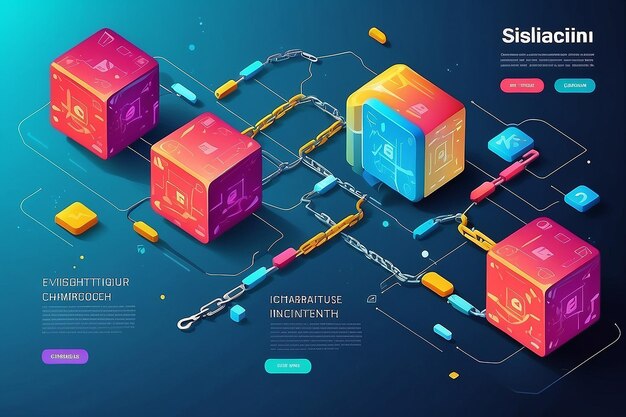How US Startups Use Web3 to Disrupt Industries: A 2024 Analysis

How are US Startups Leveraging Web3 Technologies to Disrupt Traditional Industries? They’re using blockchain, decentralized finance (DeFi), and NFTs to revolutionize sectors like finance, gaming, supply chain, and healthcare, creating new business models and enhancing user experiences.
The landscape of traditional industries is undergoing a seismic shift, and at the forefront of this disruption are innovative US startups. How are US Startups Leveraging Web3 Technologies to Disrupt Traditional Industries? These companies are harnessing the power of blockchain, decentralized finance (DeFi), and non-fungible tokens (NFTs) to challenge established norms and create entirely new paradigms.
This article delves into the transformative ways US startups are employing Web3 to reshape sectors ranging from finance and gaming to supply chain and healthcare, highlighting key trends, examples, and the potential impact of this technological revolution. Let’s explore how Web3 is powering this disruption and redefining the future of business.
How are US Startups Leveraging Web3 Technologies to Reshape Finance
The financial industry, long dominated by established institutions, is ripe for disruption. US startups are increasingly turning to Web3 technologies to offer innovative financial solutions, enhance transparency, and empower users in unprecedented ways. From decentralized lending platforms to tokenized assets, Web3 is creating new opportunities for both businesses and consumers.
Decentralized Lending and Borrowing
One of the most significant applications of Web3 in finance is decentralized lending and borrowing. Platforms built on blockchain technology allow users to lend and borrow cryptocurrency assets without the need for traditional intermediaries like banks. This fosters greater financial inclusion and offers more competitive interest rates.
Tokenization of Assets
Tokenization is another area where Web3 is making waves. By representing real-world assets such as real estate, artwork, or commodities as digital tokens on a blockchain, startups are increasing liquidity and accessibility. This allows for fractional ownership and democratizes investment opportunities previously limited to a select few.
- Lower Transaction Costs: Web3 platforms often have lower transaction costs compared to traditional financial institutions.
- Increased Transparency: Blockchain technology provides a transparent and immutable record of all transactions.
- 24/7 Accessibility: Web3 services are typically available 24/7, eliminating the constraints of traditional banking hours.
- Global Reach: Decentralized platforms can facilitate transactions across borders without the complexities of international banking.

In conclusion, US startups are leveraging Web3 technologies to revolutionize the finance industry by creating more accessible, transparent, and efficient financial solutions. Decentralized lending and asset tokenization are just two examples of how these innovations are reshaping traditional financial models.
Transforming the Gaming Industry with Web3
The gaming industry is another area ripe for disruption, and US startups are at the forefront of integrating Web3 technologies to create more immersive, rewarding, and community-driven gaming experiences. From play-to-earn models to NFT-based in-game assets, Web3 is fundamentally changing the way games are developed, distributed, and played.
Play-to-Earn (P2E) Gaming
One of the most notable trends in Web3 gaming is the rise of play-to-earn (P2E) models. These games reward players with cryptocurrency or NFTs for their time and effort. This creates a more engaging and potentially lucrative gaming experience, where players can earn real-world value while enjoying their favorite games.
NFTs and In-Game Assets
Non-fungible tokens (NFTs) are also transforming the gaming industry. NFTs can represent unique in-game assets such as characters, weapons, or virtual land. These assets can be bought, sold, and traded on NFT marketplaces, giving players true ownership of their digital items.
- Enhanced Engagement: P2E models and NFT-based assets increase player engagement and retention.
- New Revenue Streams: Web3 gaming opens up new revenue streams for both developers and players.
- Community Ownership: Decentralized gaming platforms empower communities and give players a greater say in game development.
- Interoperability: NFTs can potentially be used across multiple games, creating interconnected gaming ecosystems.
Ultimately, how US Startups are Leveraging Web3 Technologies to Disrupt Traditional Industries like gaming is driving innovation and creating more rewarding experiences for players. By integrating P2E models and NFTs, these startups are transforming gaming into a more engaging and potentially lucrative activity.
Web3 and Supply Chain Management: Enhancing Transparency and Efficiency
Supply chain management is a complex and often opaque process involving multiple stakeholders and layers of intermediaries. US startups are utilizing Web3 technologies to enhance transparency, improve efficiency, and reduce fraud in supply chains. By leveraging blockchain technology, these companies are creating more secure and traceable supply chain networks.
Blockchain-Based Tracking
Blockchain technology enables the creation of immutable and transparent records of product movement throughout the supply chain. This allows businesses and consumers to track the origin, authenticity, and condition of products in real-time, reducing the risk of counterfeit goods and improving overall accountability.
Smart Contracts for Automation
Smart contracts, self-executing agreements written into code, can automate various processes within the supply chain. For example, smart contracts can automatically release payments upon verification of product delivery or automatically trigger insurance claims in case of damage or loss.
- Improved Traceability: Blockchain provides end-to-end traceability of products, from origin to consumer.
- Reduced Fraud: Immutable records and smart contracts minimize the risk of counterfeit goods and fraudulent activities.
- Increased Efficiency: Automation through smart contracts streamlines processes and reduces delays.
- Enhanced Trust: Transparent supply chains build trust among stakeholders and consumers.
In summary, US startups are effectively leveraging Web3 technologies to enhance transparency and efficiency in supply chain management. Blockchain-based tracking and smart contracts are key tools driving this transformation, creating more secure and reliable supply chain networks.

Revolutionizing Healthcare with Web3: Data Security and Patient Empowerment
The healthcare industry faces significant challenges in terms of data security, patient privacy, and access to medical records. US startups are exploring Web3 technologies to address these issues and empower patients with greater control over their healthcare data. Blockchain and decentralized storage solutions are at the heart of this revolution.
Secure Data Storage
Blockchain offers a secure and decentralized way to store sensitive healthcare data. By distributing data across a network of nodes, blockchain makes it more resistant to hacking and data breaches compared to traditional centralized databases. This enhances patient privacy and protects valuable medical information.
Patient-Controlled Access
Web3 technologies enable patients to control who has access to their medical records. Using blockchain-based identity solutions, patients can grant permissions to doctors, hospitals, and other healthcare providers, ensuring that their data is only shared with authorized parties.
- Enhanced Security: Decentralized data storage reduces the risk of data breaches and unauthorized access.
- Patient Empowerment: Patients gain greater control over their medical records and data privacy.
- Improved Interoperability: Blockchain can facilitate the secure and seamless exchange of data between different healthcare providers.
- Reduced Administrative Costs: Streamlined data management through blockchain can reduce administrative overhead.
Fundamentally, how US Startups are Leveraging Web3 Technologies to Disrupt Traditional Industries in healthcare involves enhancing data security and empowering patients. Secure data storage and patient-controlled access are vital components of this transformation, fostering a more secure and patient-centric healthcare ecosystem.
The Future of Web3 Disruption in US Industries
As Web3 technologies continue to evolve, the potential for disruption across US industries is immense. Startups are constantly exploring new applications for blockchain, DeFi, and NFTs, pushing the boundaries of what is possible. This ongoing innovation promises to reshape the way businesses operate and interact with their customers.
Emerging Trends and Technologies
Several emerging trends and technologies are poised to further accelerate Web3 disruption. These include layer-2 scaling solutions, decentralized autonomous organizations (DAOs), and the metaverse. Each of these areas offers unique opportunities for startups to create innovative solutions and disrupt traditional industries.
Challenges and Opportunities
While the potential of Web3 is vast, there are also challenges that need to be addressed. These include regulatory uncertainty, scalability issues, and the need for greater user education. Overcoming these challenges will be crucial for realizing the full potential of Web3 disruption.
- Regulatory Clarity: Clear and consistent regulations are needed to foster innovation and protect consumers.
- Scalability Solutions: Advancements in layer-2 solutions are essential for improving the scalability of blockchain networks.
- User Education: Educating users about the benefits and risks of Web3 is crucial for mass adoption.
- Interoperability Standards: Developing standards for interoperability will enable seamless integration between different Web3 platforms.
In conclusion, the future of Web3 disruption in US industries is bright. By addressing the challenges and embracing emerging trends, startups can continue to drive innovation and reshape traditional business models. The question of how US Startups are Leveraging Web3 Technologies to Disrupt Traditional Industries isn’t just relevant now; it defines the trajectory of future economic growth and innovation.
| Key Point | Brief Description |
|---|---|
| 🚀 DeFi Innovation | Web3 startups offer decentralized lending and tokenized assets. |
| 🎮 P2E Gaming | Web3 games use P2E models and NFTs for in-game assets. |
| 📦 Supply Chain Transparency | Blockchain tracking enhances supply chain efficiency and trust. |
| 🏥 Healthcare Security | Web3 startups secure healthcare data and empower patients. |
Frequently Asked Questions
US startups are using Web3 to offer decentralized lending platforms, tokenized assets, and enhanced transparency, challenging traditional financial institutions. These innovations aim to create a more accessible and efficient financial ecosystem.
NFTs provide true ownership of in-game assets, allowing players to buy, sell, and trade unique items. This fosters enhanced engagement, new revenue streams, and community ownership within gaming platforms.
Blockchain creates immutable records of product movement, enabling end-to-end traceability and reducing fraud. This improves trust among stakeholders and consumers by providing real-time tracking and verification.
Web3 enhances data security through decentralized storage and empowers patients to control their medical records. This improves privacy, interoperability, and overall data management in healthcare.
US startups face challenges like regulatory uncertainty, scalability issues, and the need for greater user education. Overcoming these hurdles is crucial for realizing the full potential of Web3 disruption across industries.
Conclusion
In summary, US startups are at the forefront of a transformative wave, demonstrating how US Startups are Leveraging Web3 Technologies to Disrupt Traditional Industries. From finance and gaming to supply chain and healthcare, the innovative use of blockchain, DeFi, and NFTs is creating new business models and empowering users.
As Web3 continues to evolve, it promises to reshape the landscape of US industries, offering greater efficiency, transparency, and user control. By addressing the challenges and embracing emerging trends, these startups are paving the way for a more decentralized and innovative future.





